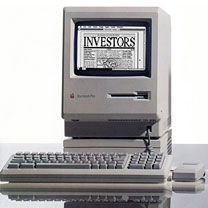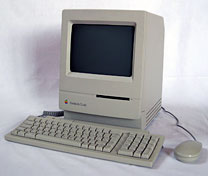Alan Zisman wrote this in September 2000 and recently
emailed me a note that the Mac Plus lab was finally replaced circa
2002. The point remains: Until the hardware dies, old computers can do
anything they did when they were new.
One of the most common complaints of computer owners is, "I just
bought the darn thing, and already it's obsolete!"
Most businesses, it seems, for tax purposes claim that their
computer hardware depreciates over three years - at the end of that
period, it's effectively worthless.
But none of this means that your older computer is without value.
That older computer can still do everything it did when it was brand
spanking new.
Unlike big businesses, schools can rarely (if ever) afford to
upgrade their computers every three years. In many cases, your children
are continuing to get good use of technology that most businesses and
homes have long ago consigned to the scrap heaps.
Strathcona Elementary, in East Vancouver's Chinatown, serves 560
children. Money is always an issue, but early on, parents, teachers,
and administrators realized that computers could be an effective tool
to help students learn.
During the early 1980s, teachers started experimenting with a
Commodore PET
and a Radio Shack
TRS-80, which were, over the next few years, according to
then-teacher Robert Moore, "replaced by Commodore 64s, slowly
and painfully fundraised by parents, teachers, and kids, with the
school struggling to buy two or three each year". Eventually, the
school got to the point where they could have their own lab of
C-64s.
By 1987-88, however, the school was becoming increasingly aware of
the limitations of the Commodore 64s. Principal Noel Herron started
looking at fund-raising alternatives to get a modern lab, while Moore,
like many teachers at the time, had become, in his own words,
"overwhelmed with the potential of HyperCard", a pioneering hypertext
application only available for Apple's Macintosh. Moore also "very much
appreciated the Mac's desktop interface and desktop publishing
features, and saw these as vastly superior and vastly more accessible
to kids and teachers than DOS".

The Mac Plus, discontinued 1990.
As a result, Moore and Herron produced a plan and a budget to buy a
state-of-the-art Mac lab and presented it to the Chinatown Rotary Club.
The club raised $40,000, enabling the school to buy and network 20
Mac Plus computers in 1989.
The school was able to dedicate one half of Moore's teaching time to
team-teaching with the other staff in the new lab and to use the lab as
a tool for English as a Second Language (ESL) instruction.
Just to keep this in perspective, "state-of-the-art" in 1989 meant a
black-and-white desktop Mac with a couple of megs of RAM and no hard
drive.
By current standards, these computers would have been declared
"obsolete" long ago and would be no more than a distant memory. But
while state-of-the-art no more, at Strathcona, the Mac Plus lab is
still in use every day. By the mid-1990s, the school was able to build
a second lab with newer Macs.

Mac Classic II, discontinued 1993.
With no hard drives, the Mac Pluses are connected to a pair of
servers, themselves a far cry from the super-powered machines we tend
to think of in that role - Mac Classic IIs, each with a
full 80 MB of drive space. Software used includes All the Right Type
keyboarding software, Microsoft Works, HyperCard, and SuperPaint.
According to current Strathcona teacher Wing Wong, student HyperCard
stacks from past years - ghost stories, histories of Chinatown, and
pictures of historic houses - have been saved on the network and are
brought out to help teach this year's crop of students to read.
After twelve years of operation, it is becoming difficult to keep
the lab up and running. The Vancouver School Board no longer offers
technical support for this older equipment, and parts have become
increasingly expensive - teacher Wong keeps a stock of dead Macs for
parts, having been quoted a price of $200 to replace an old style Mac
mouse.
He remembers the day "when a student tapped me on my back and calmly
said, 'I think I have a problem at my workstation'. I looked up to see
a plume of white smoke steadily rising from one of the computers." A
capacitor on the computer's motherboard had melted - a problem that has
since occurred on three other computers. Despite the loss of these
computers, donations of older Macs from parents, businesses, and other
schools have enabled Strathcona to keep the lab in operation.
The school has gotten some newer computers - they have recently
purchased some iMacs and have received half a dozen PCs and a server as
part of a donation from IBM to Vancouver inner-city schools. The use of
computers has changed. "Kids don't really need teaching 'how' to use a
computer to do basic tasks such a word processing anymore - they need
teaching how to use a computer to help their learning" says Robert
Moore.
Through it all, Strathcona's 1989-era collection of Mac Pluses
continues to introduce computing to a new generation of students.
They ought to declare it a heritage site.





